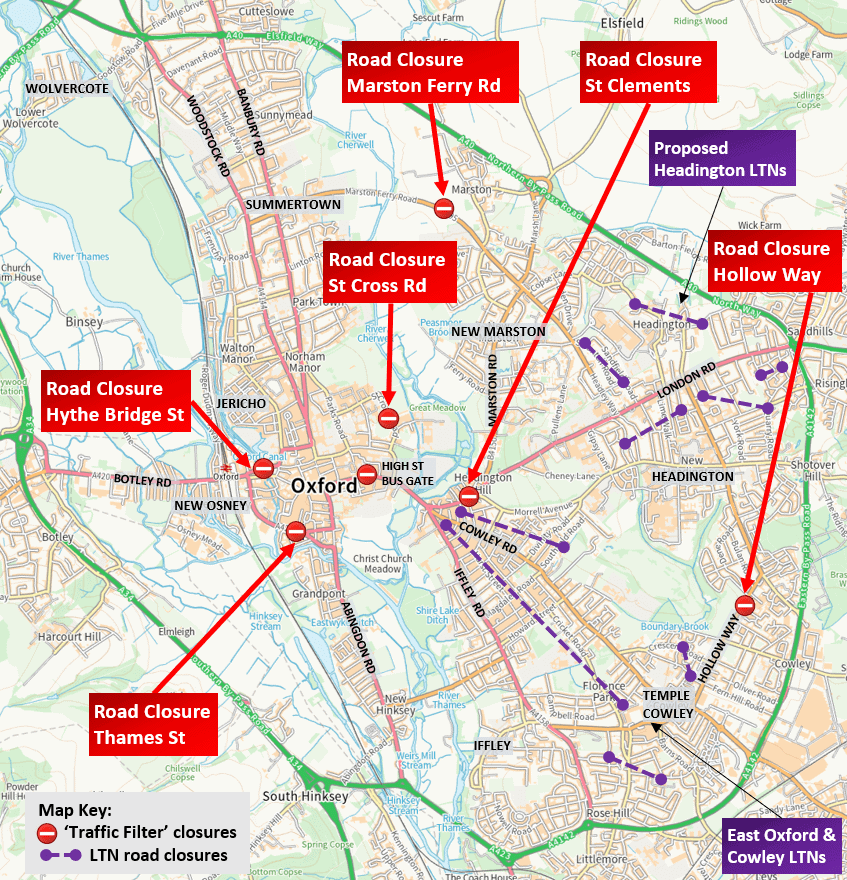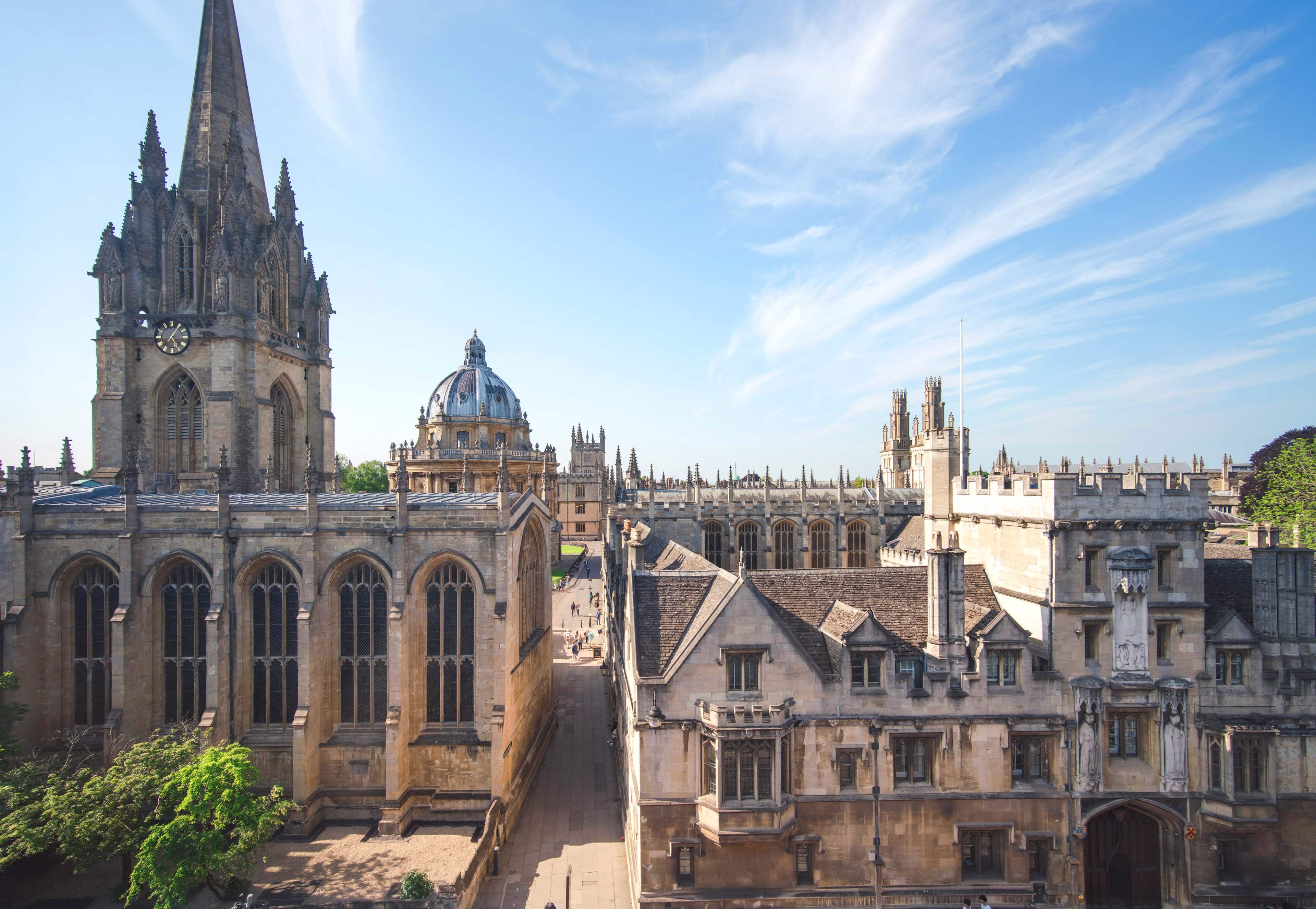Official Statement from The Oxford Collection. (Download this press release.)
Oxford, 21st November 2022: Oxfordshire County Council is proposing six new ‘traffic filters’, essentially road closures, on six of Oxford’s main roads. The current proposals include six traffic filters, three of which will be located in the city centre on St Cross Road; Thames Street and Hythe Bridge Street, and the remaining three filters will be located on: St Clements; Marston Ferry Road; Hollow Way (see map).
The traffic filters which are proposed to be installed will divide the city of Oxford into six zones and movement between the zones will be restricted, seven days a week, 12 hours a day, between 7.00am and 7.00pm, or drivers will face a £70 fine if they do not have the necessary permit or exemption.
Due to the limited exemptions, lack of economic and cultural impact assessments, and the city council’s disputable consultation process, The Oxford Collection, which comprises the Old Bank Hotel, Quod Restaurant & Bar, Old Parsonage Hotel, Parsonage Grill & Gees Restaurant & Bar, regards these proposals as detrimental for its businesses and the economic and cultural well-being of the city.
In particular, permits will not be available to private cars that are visitors to the city, traveling for the purpose of business or tourism. Visitors from out-of-town, who arrive by car, will be unable to travel through any traffic filters during peak hours, even at weekends. For example, visitors traveling by car from London Heathrow via the M40 to Old Bank Hotel would ordinarily drive along St Clement’s Street and onto the High Street, driving via the West of the city from the ring road; a route of approximately 43.6 miles by car or 45.6 miles if coming via the longer Southern route along Iffley Road. With the proposed traffic filter on St Clement’s Street, this popular St Clement’s route into Oxford would not be available during peak times. The shortest alternative routes available would be via Iffley Road, and via Cowley Road, both already over-congested roads, both of which increase the route distance and journey time. This is one small example illustrating the nature of the impositions and their adverse effect on the proposal’s core objectives.
The county council outlines the core objectives of the traffic filters aimed at reducing “unnecessary journeys by private vehicles and make walking, cycling, public and shared transport the natural first choice” and states that the scheme will aid in delivering “an affordable, sustainable and inclusive transport system.”
We support the city council’s objectives: to reduce emissions; improve air quality in Oxford; improve bus journey’s reliability, frequency, and speed, to create safer cycling paths; encourage walking and cycling as preferred means of transport and in investing in the communities long-term health and wellbeing.
We however do not believe that the proposed traffic filters will achieve the objectives it sets out to achieve.
We are not satisfied that the 18-month-long experiment will reduce emissions; and believe that a large-scale traffic experiment such as this cannot be viewed in isolation, in so far as that the economic health and well-being of Oxford’s communities ought to be considered by Oxfordshire County Council, which has not been done. Additionally, it is our belief that a large population of concerned residents and businesses have not been considered during the consultation process itself.
Our founder and managing director Jeremy Mogford has said: ”We have no qualms with the county council proposing new and dynamic ways to transform the city of Oxford, but this cannot be undertaken without necessary collaboration with all types of parties affected by such a scheme. In the very least, if the scheme were to proceed, we would be forced to accept its imposition and would demand for reasonable time-frames for implementation, for sensible support for those affected, and for a balanced process from the start to finish.
All we ask for is something that is practical, sensible and balanced. This 18-month-long experiment has been modelled and consulted in a vacuum, through a lens only focused on the means of traveling by foot, bicycle, car or bus – how can it be balanced? There is more to life than means of transport, there is more to a city – there are people, businesses, supply chains, workers, students, residents and visitors. The four pillars of an economy are people; the environment; community and business – so why has business been ignored?”
The independent businesses of Oxford’s historic city centre are already under pressure as a result of the ongoing exodus of national chains to the Westgate centre, a reduced number of available on-street parking spaces, and a sharp increase in the price of the few remaining spaces. This is to say nothing of the double blow the cost-of-living crisis is dealing to businesses, increasing their costs at the same time as disinclining customers from spending the reduced disposable income they have available. Energy bills are soaring and supply chains are increasingly unstable. There are still many empty sites on Oxford’s High Street. Talk of the majority of those being ‘under offer’ is hugely misleading, and many have sat dormant for years, with only prohibitively expensive and punitive rental agreements on offer. New independent businesses cannot afford rents and national chains are eschewing them in favour of the Westgate centre.
Oxford County Council’s proposals to introduce six bus gates or ‘traffic filters’ on key interconnecting roads around the city threaten to devastate remaining trade. No economic impact assessment has been made and both councilors and officers have also confirmed that there are currently no plans in place to support local businesses as they adjust to the impact on trade made by the traffic filters, should they be introduced. Many shop-front business owners are also personally liable for their business rent, so not only is their business and livelihood at stake, but so is their personal financial solvency.
We are an independently owned collection with a long-standing commitment to the city of Oxford and comprise of five local hospitality venues serving over 270 000 restaurant-goers and 16 000+ hotel residents in the last nine months alone.
We support the introduction of new and dynamic ways to transform the city of Oxford through measures tackling climate concerns, emission targets and air quality, and effective means of transportation aimed at improving the well-being of residents and visitors to the city.
However, such support is limited to such investigations and actions taken by travel and town planners that are practical, sensible and balanced, and which include not only social and environmental assessments but also economic and cultural impact assessments.
We, therefore, urge decision-makers to facilitate sensible measures, with the interests of residents; visitors to the city, as well as business in mind, with reasonable time-frames, aided by appropriate support for those affected and for a balanced process from the start to finish, in an effort for resident and visitor communities to feel safe and considered.
In order to oppose the damaging traffic filter proposal we have joined up with local organisations: Oxford Business Action Group (OBAG), Oxford High Street Association (OHSA), ROX (Backing Oxford Business), Reconnecting Oxford, Jericho Traders, and Summertown Traders representing thousands of businesses, colleges, professional organisations, and concerned residents throughout Oxford, as well as visitors to the city. Together, these organisations are currently fundraising toward a legal challenge against Oxfordshire County Council. We consider that decision if taken at a meeting of the Council proposed to be held on 29 November 2022 will be unlawful.
Please pass on this important message to friends, neighbours, and acquaintances, and consider contributing to the initiative here: https://www.gofundme.com/f/stop-oxfords-traffic-filters.

Proposed Oxford Traffic Filters Map










